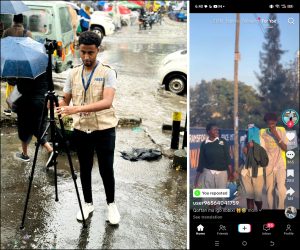Nairobi is a city full of promise, culture, youth energy, and academic ambition, yet underneath that vibrancy, an unfortunate concern has been growing: increasing reports of harassment, cat-calling, intimidation, and even physical aggression targeted at school girls — allegedly by certain youth groups in the city. Many Nairobi parents, teachers, and community elders are sounding the alarm, not to attack any tribe or religion, but to protect children who deserve safety on their way to and from school.

For weeks, school administrators, guardians, and students themselves have whispered, complained, filmed incidents, and shared stories online describing groups of boys loitering near bus stops, estates, shopping areas, and matatu stages — harassing uniformed girls. These actions erode confidence, create fear, and compromise the dignity of young Kenyan girls whose only crime is going home after class.
This is a call for responsibility, accountability, and leadership — especially from influential Somali community elders, activists, politicians, and public voices like Magical Moha, a man known for exposing wrongdoing with boldness. The question being asked across Nairobi now is simple:
If crimes are happening, why isn’t every leader addressing them boldly — evenly — regardless of tribe?
Why Mouthy Magical Moha and Other Somali Leaders Must Address The Rise of Reported Harassment Against School Girls by Somali Youth Groups in Nairobi
1. A Growing Safety Problem Nairobi Cannot Ignore
Reports continue to surface showing groups of young men approaching school girls, following them, taking videos without consent, touching them, demanding attention, and humiliating those who resist. Whether every case is confirmed or not, parents are scared — and children feel unsafe in their own city.This must not become normal.

Because when society normalizes harassment at school-age, it breeds violence later. These girls are future mothers, professionals, leaders. Their safety today defines their confidence tomorrow.
Nairobi must defend its daughters without fear of tribal politics.
2. Why Leadership Silence Feels Dangerous
Communities do not fall because crime exists — they fall because leaders remain silent in the face of it.
When parents see respected voices avoid addressing misbehavior from within their own community, they begin to feel abandoned. They feel unheard. They feel as if daughters are negotiable — and that is unacceptable.
Somali leaders have the cultural authority to intervene swiftly. Their voice could save girls, reduce tension, and guide young boys back to discipline. Silence is not neutrality — it becomes participation.
3. Magical Moha: A Man Known for Exposing Evil — But Quiet Here
Magical Moha built his name on bravery, confrontation of wrongdoing, and fearless journalism. He has exposed murderers, drug cartels, fake pastors, corruption networks — he has been Kenya’s bulldog against crime.
But today, parents ask:
Where is that same fire when school girls are targeted?
Recently, he publicly took action against a non-Somali content creator — even involving law enforcement. Yet he has remained noticeably silent about harassment reports involving Somali youth groups. Whether intentional or not, this has created a public perception of selective accountability — even bias.
The message it sends is painfully interpreted as:
When misconduct is external, it is addressed.
When misconduct comes from within the community, it is avoided.
This perception harms girls. It harms public trust. And it harms the Somali community itself, because silence invites collective blame where only a few youths are responsible.
We must demand better — but respectfully, with unity, not hatred.
4. Not All Somali Youth Are Guilty — But Leadership Must Step Up
Many Somali boys are respectful, intelligent, hardworking, religious, and kind. They too deserve protection from stereotypes. But leadership only protects them if it calls out the minority creating chaos.
If elders do not speak, outsiders generalize.
If journalists avoid discussing it, rumors grow.
If communities protect wrongdoers, they eventually become victims of their own silence.
5. What Must Happen Now — Solutions, Not War
This article is not written to shame a community — it is written to awaken it.
Immediate steps Kenya must take:
| Action | Purpose |
|---|---|
| Public condemnation from leaders | Sets moral tone & expectation |
| Community-led youth discipline | Stops harassment early |
| School-police patrol partnerships | Protects girls near hotspots |
| Social media reporting channels | Evidence-driven accountability |
| National conversation | Prevention > retaliation |
Harassment is not a cultural trait — it is a behavioral failure. And behavior can be corrected.
6. Parents Are Hurt. Girls Are Scared. Silence Helps No One.
When a 14-year-old is afraid to walk home in daylight, society has failed her.
When a school girl must change her route to avoid men three times her size, she is not free.
When girls feel unsafe near groups of loitering young men, childhood is stolen.
It does not matter who the perpetrators are — Luo, Kikuyu, Somali, Kamba, Luhya — harassment must be condemned universally.
Kenya cannot allow ethnicity to decide whose daughters get protected.
7. A Direct Appeal to Magical Moha & Somali Leaders
To Magical Moha — you are respected because you speak loudly where others whisper.
Parents ask you now:
Use your voice here, too.
Call out wrong behavior — because it is wrong.
Not because of tribe.
Not because of politics.
Not because of pressure.
Do it because you built your legacy on courage — and girls need that courage today, urgently.
Why Mouthy Magical Moha and Other Somali Leaders Must Address The Rise of Reported Harassment Against School Girls by Youth Groups in Nairobi FAQs
1. Are we accusing all Somali youth of harassment?
No. Most Somali young people are peaceful. This article targets behavior, not ethnicity. Only those involved must face accountability.
2. Why mention Magical Moha?
Because leadership comes with responsibility. His silence has become part of national discussion — and parents deserve answers.
3. Is there evidence of harassment?
Multiple videos, posts, and first-hand claims have circulated online. However, formal investigations and verified reporting are still needed.
4. Could speaking about this issue spark tribal conflict?
It could — unless addressed carefully, factually, and with peace as the goal. Accountability protects communities, it does not attack them.
5. What role should Somali leaders play?
They should openly discourage such youth behavior, support law enforcement, and guide cultural discipline through dialogue and action.
6. How can parents protect school girls now?
Travel in groups, report incidents immediately, document evidence, involve schools, and demand security where harassment occurs.
7. What does society risk by ignoring this?
Normalization of abuse. Trauma. Gender-based violence in adulthood. And eventual community resentment or retaliation.
Silence grows monsters — prevention stops them early.
Conclusion
Nairobi’s daughters deserve safety, dignity, and freedom from fear.
Communities must rise above tribal loyalty and choose morality instead.
Magical Moha, elders, teachers, and parents — we must speak boldly.
Youth must learn that manhood is protection, not intimidation.
And Kenya must defend its girls before one incident becomes one too many.
Recent Posts
The world of video gaming has experienced one of its most significant leadership changes in 2026 with a major executive transition at the head of Microsoft Gaming. For over a decade, Microsoft’s...
BOM Radar Brisbane 128km Mt Stapylton Queensland’s Weather Eye
The Bureau of Meteorology (BOM) radar at Brisbane 128km Mt Stapylton is a critical component of Australia’s weather observation system, providing real‑time radar data for rainfall, storms, and...